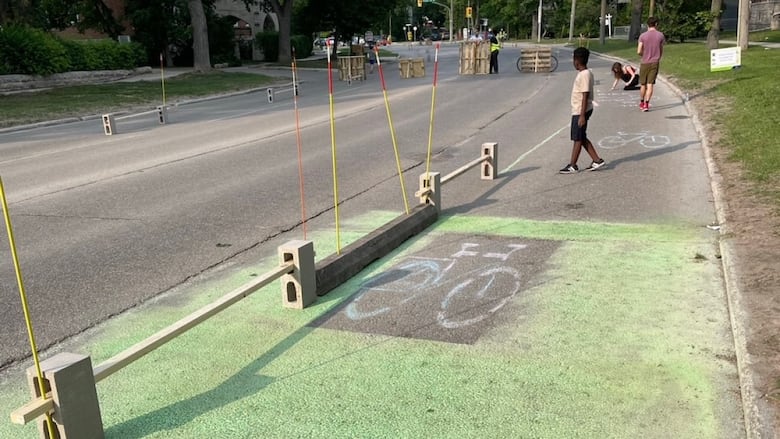Makeshift bike lane set up on Wellington Crescent on anniversary of Winnipeg cyclist's death
Advocates say city is moving too slowly to install bike lanes, reduce speeds on busy thoroughfare

Concrete cinderblocks, two-by-four planks and green paint briefly lined hundreds of metres of Winnipeg's Wellington Crescent last week, set up by bike-lane advocates to mark the anniversary of a cyclist's death in a high-speed crash there one year ago.
Organizer Michael told CBC's Marcy Markusa on Information Radio Wednesday morning that community members who live and move along the busy road feel the city is stalling instead of installing safety infrastructure.
CBC News has agreed not to use Michael's last name.
"It shouldn't be as hard as it is to get the city to take action here. We wanted to demonstrate that this is something that a bunch of people — in an hour and a half — put together. It shouldn't be taking years and years in order to design and study and build this," Michael said.

"We've gone through all the official, proper channels and we still have nothing on the ground."
The DIY bike lane went up last Friday, exactly one year since 61-year-old cyclist Rob Jenner was killed when a 19-year-old driver lost control of his vehicle while driving 159 km/h in a 50 km/h zone.
The driver, Beckham Keneth Severight, was sentenced in March to three years in prison for dangerous driving causing death.
Michael said hundreds of community members gathered at a block party to celebrate Jenner's life and install the bike lane, stretching for about 400 metres each way from Cockburn Street North to Hugo Street North.
The city took it down the same day.
'It's just not safe,' councillor says
Waverley West Coun. Janice Lukes, who chairs the city's public works committee, told CBC's Faith Fundal on Up to Speed Wednesday afternoon that the DIY bike lane was a hazard for all road users and had to be dismantled.
"We had to take it down, because you could barely see it … and at night, you would never see it and then a car would run into it or a cyclist would run into it, and there would be another disaster," Lukes said.
"It's just not safe because it's just not designed to be safe."

The city is developing a report on making cycling safer along Wellington Crescent. The committee voted to delay that report, prompting protests outside city hall last month.
Lukes said traffic engineers are still studying how the city would install "semi-permanent" barricades that would serve as a temporary barricade until Wellington undergoes road renewal.
She said that renewal isn't planned for Wellington yet, but temporary bike lanes were installed on River Avenue before they were replaced with permanent infrastructure.
"It can't be done overnight. It just takes time to properly engineer it," she said, adding that the city would also have to run public consultations with residents and other stakeholders.
"I understand it's not fast enough for some," Lukes said.
Lukes's public works committee had backed a push to reduce speeds along Wellington Crescent from 50 km/h to 30 km/h. But that motion was voted down by the city's executive policy committee in December.

Michael said he and other bike-lane advocates are frustrated that the speed-limit reduction motion stalled, while the safety report faces further delays.
Yet the city moved very quickly to tear down the DIY bike lane, he said, removing it within hours of it going up.
"I'm just so mad. They'll delay for two years in building the dang thing and that same night they find the time to come and tear it down," Michael said.
"If they actually cared about keeping people safe, they'd be building something instead."
Michael said he and other advocates plan to attend the public works committee's meeting on Thursday. Lukes said the committee will listen to their concerns.
With files from Marcy Markusa and Faith Fundal


